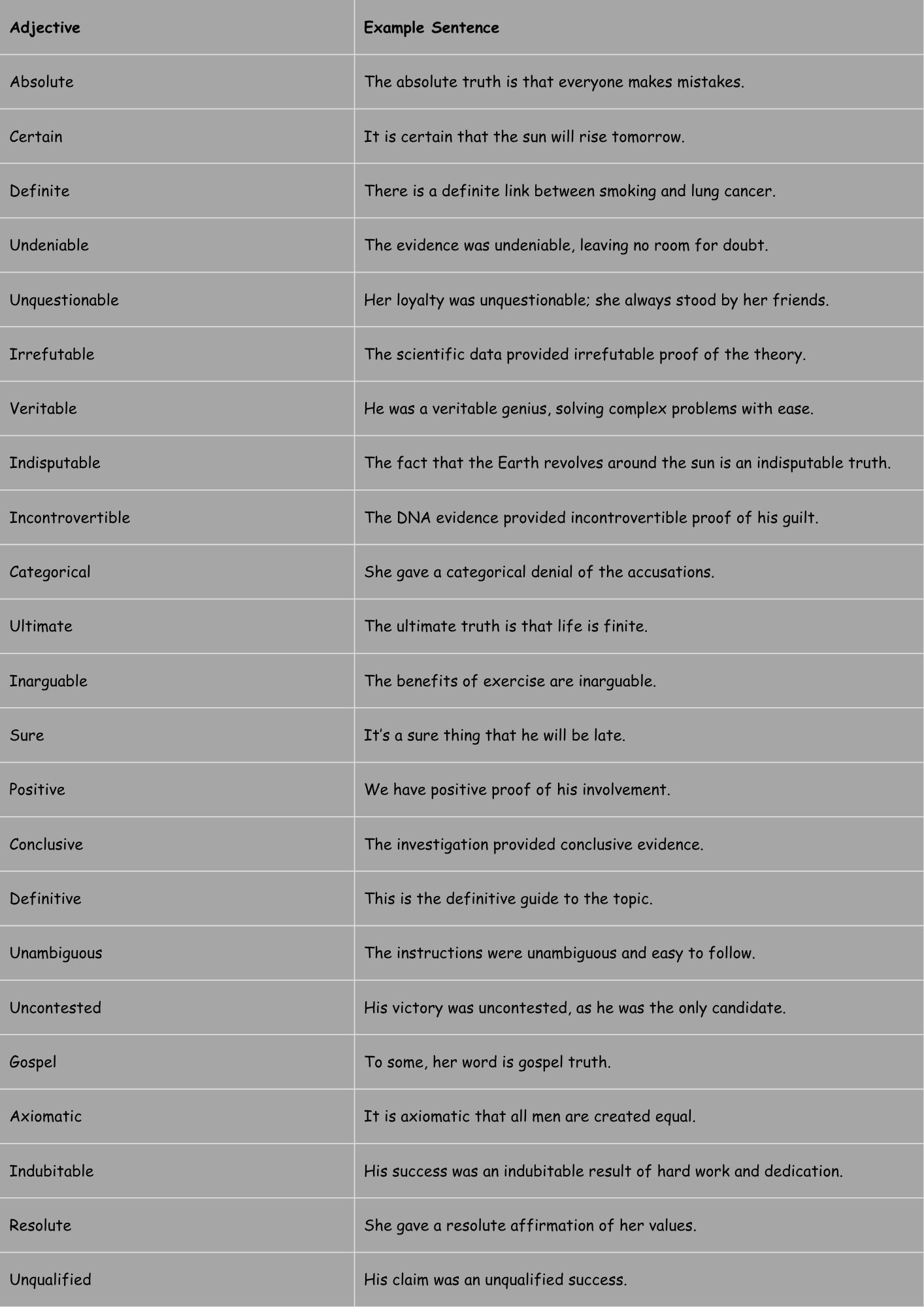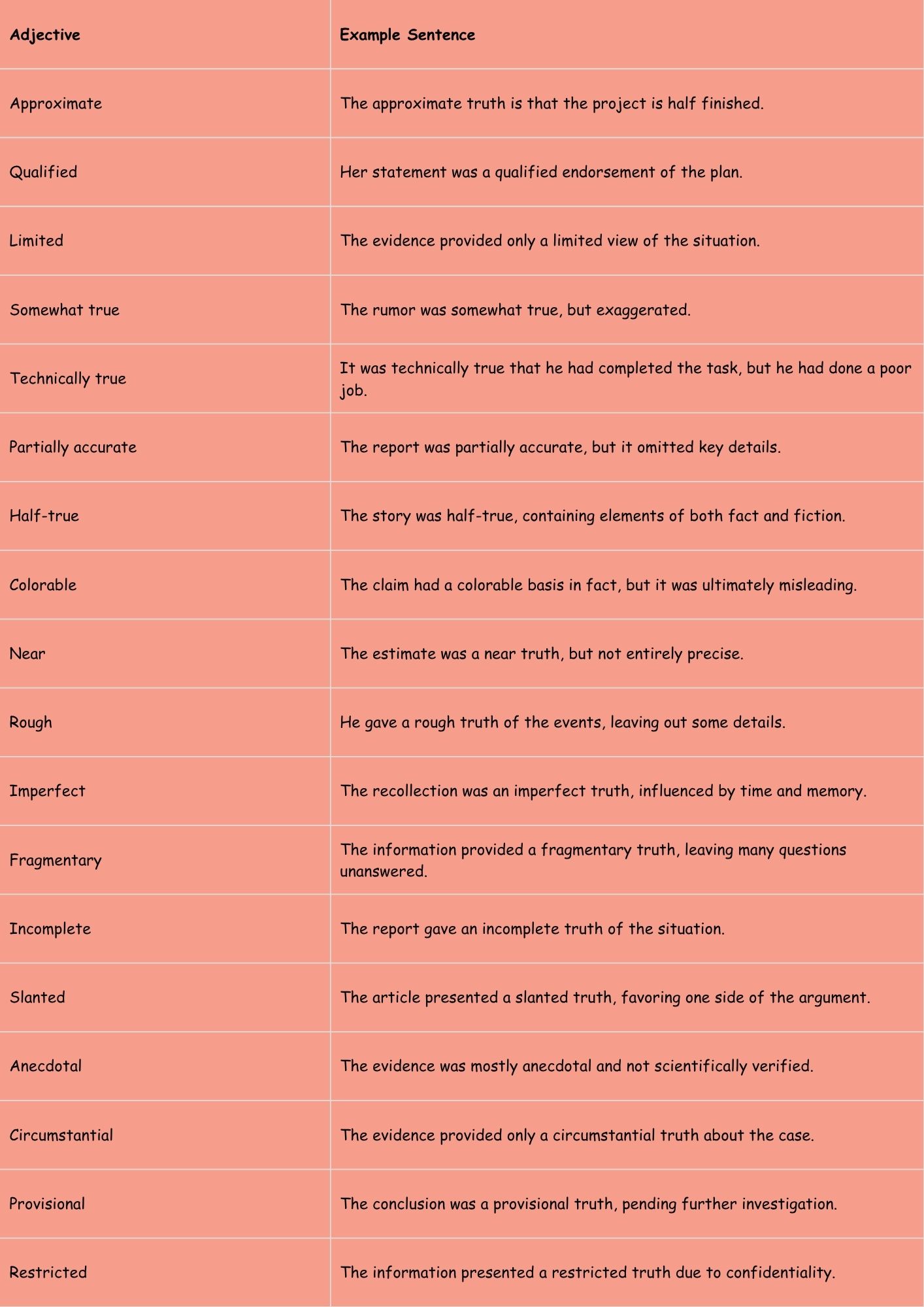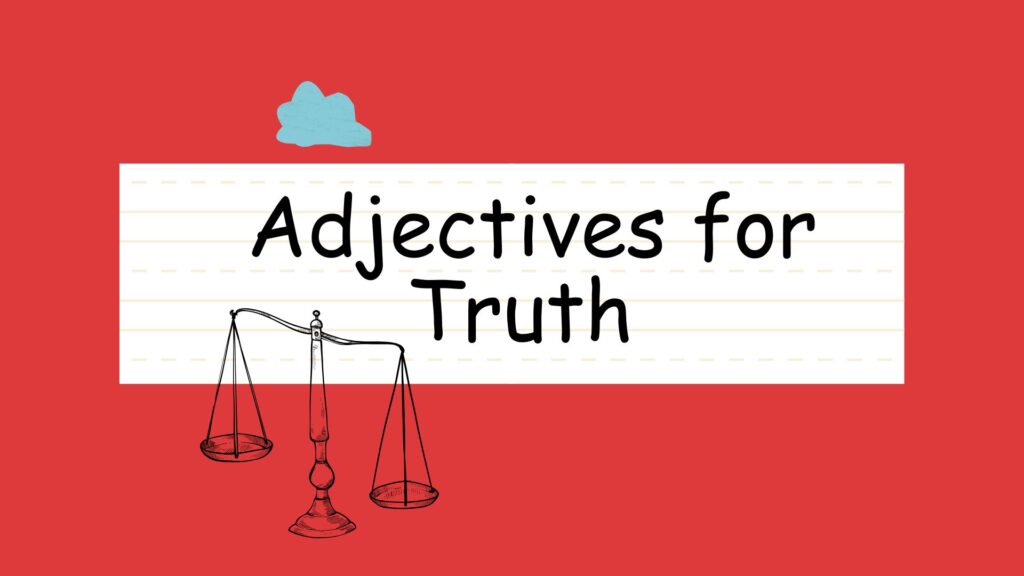Understanding how to accurately describe the concept of “truth” is crucial for clear and effective communication. English offers a rich variety of adjectives that go beyond the simple “true” or “false.” Mastering these adjectives allows you to express nuances, degrees of certainty, and different perspectives on truth. This guide provides a detailed exploration of adjectives used to describe truth, their meanings, usage rules, and common mistakes. This article will benefit students learning English as a second language, writers seeking to enhance their vocabulary, and anyone interested in improving their communication skills.
This comprehensive guide will help you master the nuances of using adjectives to describe truth. From basic definitions to advanced usage, we’ll cover everything you need to know to use these words accurately and effectively.
Table of Contents
- Definition of Adjectives for Truth
- Structural Breakdown
- Types and Categories of Adjectives for Truth
- Examples of Adjectives for Truth
- Usage Rules for Adjectives of Truth
- Common Mistakes
- Practice Exercises
- Advanced Topics
- FAQ
- Conclusion
Definition of Adjectives for Truth
Adjectives for truth are words that describe the quality or state of being true. They modify nouns or pronouns to provide more specific information about the truthfulness, accuracy, or sincerity of something. These adjectives can indicate different aspects of truth, such as its absoluteness, relativity, factual basis, or the speaker’s belief in it. Understanding these nuances is essential for precise and effective communication.
Adjectives of truth are crucial for expressing degrees of certainty and different perspectives. They allow us to differentiate between statements that are objectively verifiable and those that are based on personal beliefs or interpretations. The context in which these adjectives are used significantly impacts their meaning and interpretation.
Structural Breakdown
Adjectives for truth, like all adjectives, typically precede the noun they modify (attributive position) or follow a linking verb (predicative position). They can also be part of adjective phrases that provide more detailed descriptions. Understanding these structural elements helps in constructing grammatically correct and meaningful sentences.
Here’s a breakdown of how adjectives for truth function structurally:
- Attributive Position: The adjective comes before the noun. Example: The veritable evidence convinced the jury.
- Predicative Position: The adjective follows a linking verb (e.g., be, seem, appear, become). Example: The story seemed accurate.
- Adjective Phrases: Adjectives can be part of a longer phrase. Example: The information was completely and utterly truthful.
Types and Categories of Adjectives for Truth
Adjectives describing truth can be categorized based on the aspect of truth they emphasize. These categories help to understand the different dimensions of truth and how they are expressed in language. The following sections will delve into these categories with detailed explanations and examples.
Absolute Truth
Absolute truth refers to statements or facts that are universally and unconditionally true, regardless of context or perspective. These adjectives emphasize the unwavering and undeniable nature of the truth being described. It represents something that is true for everyone, everywhere, and at all times.
Examples include: absolute, certain, definite, undeniable, unquestionable, irrefutable, veritable.
Relative Truth
Relative truth refers to statements or facts that are true only in a specific context, perspective, or belief system. These adjectives acknowledge that truth can be subjective and contingent. Relative truths are often influenced by cultural, personal, or situational factors.
Examples include: arguable, contextual, subjective, perceived, ostensible.
Factual Truth
Factual truth refers to statements or facts that can be verified through evidence, observation, or data. These adjectives emphasize the objective and verifiable nature of the truth being described. Factual truths are based on empirical evidence and can be proven through scientific or historical methods.
Examples include: accurate, authentic, demonstrable, evidential, genuine, verifiable, factual.
Sincere Truth
Sincere truth refers to statements or beliefs that are genuinely held by the speaker, even if they are not necessarily objectively verifiable. These adjectives emphasize the speaker’s honesty and conviction in expressing their beliefs. Sincere truths are based on personal experiences, feelings, or faith.
Examples include: candid, earnest, frank, honest, guileless, sincere, upfront.
Partially True
Partially true refers to statements that contain elements of truth but are not entirely accurate or complete. These adjectives acknowledge that the statement is neither completely true nor completely false. Partially true statements may involve exaggeration, simplification, or omission of relevant details.
Examples include: approximate, qualified, limited, somewhat true, technically true.
Examples of Adjectives for Truth
The following sections provide extensive examples of adjectives for truth, categorized by the types discussed above. Each example is designed to illustrate the specific meaning and usage of the adjective in context. The tables present a variety of sentences using these adjectives.
Absolute Truth Examples
These examples illustrate how adjectives denoting absolute truth are used to emphasize the undeniable and universal nature of a statement or fact. The following table provides a range of sentences using these adjectives in context.
| Adjective | Example Sentence |
|---|---|
| Absolute | The absolute truth is that everyone makes mistakes. |
| Certain | It is certain that the sun will rise tomorrow. |
| Definite | There is a definite link between smoking and lung cancer. |
| Undeniable | The evidence was undeniable, leaving no room for doubt. |
| Unquestionable | Her loyalty was unquestionable; she always stood by her friends. |
| Irrefutable | The scientific data provided irrefutable proof of the theory. |
| Veritable | He was a veritable genius, solving complex problems with ease. |
| Indisputable | The fact that the Earth revolves around the sun is an indisputable truth. |
| Incontrovertible | The DNA evidence provided incontrovertible proof of his guilt. |
| Categorical | She gave a categorical denial of the accusations. |
| Ultimate | The ultimate truth is that life is finite. |
| Inarguable | The benefits of exercise are inarguable. |
| Sure | It’s a sure thing that he will be late. |
| Positive | We have positive proof of his involvement. |
| Conclusive | The investigation provided conclusive evidence. |
| Definitive | This is the definitive guide to the topic. |
| Unambiguous | The instructions were unambiguous and easy to follow. |
| Uncontested | His victory was uncontested, as he was the only candidate. |
| Gospel | To some, her word is gospel truth. |
| Axiomatic | It is axiomatic that all men are created equal. |
| Indubitable | His success was an indubitable result of hard work and dedication. |
| Resolute | She gave a resolute affirmation of her values. |
| Unqualified | His claim was an unqualified success. |

Relative Truth Examples
These examples illustrate how adjectives denoting relative truth are used to acknowledge that truth can be subjective or context-dependent. The following table provides a range of sentences using these adjectives in context.
| Adjective | Example Sentence |
|---|---|
| Arguable | It is arguable whether technology improves our lives. |
| Contextual | The meaning of the statement is highly contextual. |
| Subjective | Beauty is subjective; what one person finds attractive, another may not. |
| Perceived | The perceived truth was different from the actual reality. |
| Ostensible | The ostensible reason for his absence was illness, but I suspect something else. |
| Conditional | His statement was conditional on certain events occurring. |
| Personal | Truth, in the end, is often personal and unique to each individual. |
| Interpretive | The data is interpretive and can be viewed in multiple ways. |
| Perspective | From her perspective, the situation looked very different. |
| Circumstantial | The evidence was circumstantial, making it difficult to prove his guilt. |
| Conventional | The conventional wisdom is that hard work leads to success. |
| Assumed | The assumed truth turned out to be false. |
| Supposed | The supposed culprit was later found innocent. |
| Seeming | The seeming agreement was actually full of loopholes. |
| Apparent | The apparent reason for his departure was a new job. |
| Nominal | The nominal truth of the matter was far from the reality. |
| Presumptive | The presumptive evidence suggested a different outcome. |
| Qualified | Her statement was a qualified acceptance of the proposal. |
| Tentative | They reached a tentative truth about the situation. |
Factual Truth Examples
These examples illustrate how adjectives denoting factual truth are used to emphasize the verifiable and objective nature of a statement or fact. The following table provides a range of sentences using these adjectives in context.
| Adjective | Example Sentence |
|---|---|
| Accurate | The report provided an accurate account of the events. |
| Authentic | The document was proven to be authentic after expert analysis. |
| Demonstrable | The link between cause and effect was demonstrable through experiments. |
| Evidential | The case was built on evidential proof. |
| Genuine | The artwork was a genuine masterpiece. |
| Verifiable | The claims made in the article were verifiable through independent sources. |
| Factual | The news report presented a factual account of the incident. |
| Empirical | The study provided empirical evidence to support the hypothesis. |
| Documented | The historical events were well documented in various sources. |
| Confirmed | The rumors were confirmed by official sources. |
| Corroborated | The witness’s testimony was corroborated by video evidence. |
| Validated | The research findings were validated by peer review. |
| Substantiated | The allegations were substantiated by multiple witnesses. |
| Objective | The journalist aimed to provide an objective account of the situation. |
| Definable | The variables in the experiment were clearly definable. |
| Established | It is an established fact that exercise is good for your health. |
| Proven | The theorem has been proven through rigorous mathematical analysis. |
| Certified | The diamond was certified as authentic by a gemological institute. |
| Testable | The scientific hypothesis was testable through a series of experiments. |
Sincere Truth Examples
These examples illustrate how adjectives denoting sincere truth are used to emphasize the honesty and conviction of the speaker. The following table provides a range of sentences using these adjectives in context.
| Adjective | Example Sentence |
|---|---|
| Candid | She gave a candid assessment of the situation. |
| Earnest | He made an earnest plea for forgiveness. |
| Frank | In a frank discussion, they addressed their concerns. |
| Honest | He gave an honest answer to the question. |
| Guileless | Her guileless nature made her instantly likeable. |
| Sincere | He offered a sincere apology for his mistake. |
| Upfront | She was upfront about her intentions from the beginning. |
| Genuine | Her genuine concern for others was evident in her actions. |
| Forthright | He was forthright in his criticism of the policy. |
| Open | She was open and honest about her past struggles. |
| Truthful | He was always truthful in his dealings with others. |
| Direct | She gave a direct answer without hesitation. |
| Heartfelt | His heartfelt gratitude was evident in his voice. |
| Bona fide | He showed a bona fide commitment to the project. |
| Veracious | The witness gave a veracious account of the events. |
| Unfeigned | His concern was unfeigned and deeply felt. |
| Candid | She gave a candid and honest assessment of her performance. |
| Straightforward | He provided a straightforward explanation without any ambiguity. |
Partially True Examples
These examples illustrate how adjectives denoting partially true statements are used to acknowledge that a statement contains elements of truth but is not entirely accurate. The following table provides a range of sentences using these adjectives in context.
| Adjective | Example Sentence |
|---|---|
| Approximate | The approximate truth is that the project is half finished. |
| Qualified | Her statement was a qualified endorsement of the plan. |
| Limited | The evidence provided only a limited view of the situation. |
| Somewhat true | The rumor was somewhat true, but exaggerated. |
| Technically true | It was technically true that he had completed the task, but he had done a poor job. |
| Partially accurate | The report was partially accurate, but it omitted key details. |
| Half-true | The story was half-true, containing elements of both fact and fiction. |
| Colorable | The claim had a colorable basis in fact, but it was ultimately misleading. |
| Near | The estimate was a near truth, but not entirely precise. |
| Rough | He gave a rough truth of the events, leaving out some details. |
| Imperfect | The recollection was an imperfect truth, influenced by time and memory. |
| Fragmentary | The information provided a fragmentary truth, leaving many questions unanswered. |
| Incomplete | The report gave an incomplete truth of the situation. |
| Slanted | The article presented a slanted truth, favoring one side of the argument. |
| Anecdotal | The evidence was mostly anecdotal and not scientifically verified. |
| Circumstantial | The evidence provided only a circumstantial truth about the case. |
| Provisional | The conclusion was a provisional truth, pending further investigation. |
| Restricted | The information presented a restricted truth due to confidentiality. |

Usage Rules for Adjectives of Truth
Using adjectives for truth correctly requires understanding their specific meanings and the contexts in which they are appropriate. Here are some key rules to follow:
- Choose the Right Adjective: Select the adjective that best reflects the aspect of truth you want to emphasize (e.g., absolute vs. relative, factual vs. sincere).
- Consider the Context: The context of the sentence and the overall discussion should guide your choice of adjective.
- Avoid Redundancy: Do not use adjectives that are already implied by the noun they modify. For example, saying “factual fact” is redundant.
- Pay Attention to Connotations: Be aware of the connotations associated with different adjectives. Some adjectives may carry positive or negative implications.
- Use Adjective Phrases Effectively: Combine adjectives to provide more nuanced descriptions, but avoid excessive or unnecessary wordiness.
Understanding these rules will help you use adjectives for truth more accurately and effectively in your writing and speech. The nuances of these words can greatly enhance the clarity and precision of your communication.
Common Mistakes
Learners often make mistakes when using adjectives for truth. Recognizing these common errors and understanding how to correct them is crucial for improving accuracy.
| Incorrect | Correct | Explanation |
|---|---|---|
| The fact was absolute true. | The fact was absolutely true. / The fact was absolute. | “Absolute” is already an adjective, so adding “true” is often redundant. Use “absolutely true” or just “absolute.” |
| It’s a very factual opinion. | It’s a fact-based opinion./It’s a well-supported opinion. | Opinions are subjective, so describing them as “factual” can be contradictory. Use “fact-based” or “well-supported.” |
| The sincere fact is… | The honest truth is…/ I sincerely believe… | Facts are objective and cannot be “sincere.” Use “honest truth” or rephrase to emphasize the speaker’s belief. |
| The truth is very undeniable. | The truth is undeniable. | “Undeniable” already implies a high degree of certainty, so adding “very” is redundant. |
| That is a relative definite. | That is relatively definite. | “Definite” and “relative” are contradictory. “Relatively definite” means something is quite certain, but not completely. |
| He gave a factual sincere apology. | He gave a sincere apology. | Apologies are about feelings and intentions, not factual accuracy. “Sincere” is more appropriate. |
| The evidence was absolute verifiable. | The evidence was absolutely verifiable. / The evidence was verifiable. | “Verifiable” means something can be proven true. “Absolutely verifiable” is redundant. |
By avoiding these common mistakes, you can ensure that your use of adjectives for truth is accurate and effective. Paying attention to the nuances of these words will enhance the clarity and precision of your communication.
Practice Exercises
Test your understanding of adjectives for truth with these practice exercises. Choose the best adjective from the options provided to complete each sentence. Answers are provided at the end of the section.
- The evidence was so strong that it was considered __________. (a) arguable (b) irrefutable (c) subjective
- While not completely accurate, the report was __________ true. (a) absolutely (b) somewhat (c) undeniably
- Her __________ belief in the project made it a success. (a) factual (b) sincere (c) relative
- The scientist presented __________ data to support his theory. (a) evidential (b) ostensible (c) conditional
- The politician gave a __________ denial of the accusations. (a) categorical (b) subjective (c) approximate
- The __________ reason for his departure was a disagreement with the management. (a) ostensible (b) veritable (c) candid
- It is an __________ fact that smoking is harmful to one’s health. (a) subjective (b) established (c) arguable
- The witness provided a __________ account of the incident, leaving no room for doubt. (a) qualified (b) verifiable (c) half-true
- The jury found the defendant guilty based on __________ evidence presented by the prosecution. (a) conditional (b) demonstrative (c) demonstratable
- Her __________ concern for the well-being of others was evident in her volunteer work. (a) undeniable (b) genuine (c) qualified
Answers:
- (b) irrefutable
- (b) somewhat
- (b) sincere
- (a) evidential
- (a) categorical
- (a) ostensible
- (b) established
- (b) verifiable
- (c) demonstrable
- (b) genuine
Exercise 2: Rewrite the following sentences using a stronger or more appropriate adjective for truth.
- The story was kind of true.
- He gave a true answer.
- The evidence was very true.
- That’s a true opinion.
- She had a very true belief.
- The facts are mostly true.
- His claims were a bit true.
- Their statement was quite true.
- This is a true situation.
- The report was somehow true.
Suggested Answers:
- The story was partially true.
- He gave an honest answer.
- The evidence was undeniable.
- That’s a subjective opinion.
- She had a sincere belief.
- The facts are generally accurate.
- His claims had a colorable basis.
- Their statement was largely factual.
- This is a genuine situation.
- The report was technically true.
Advanced Topics
For advanced learners, exploring the philosophical implications of truth and the use of adjectives in complex rhetorical devices can be beneficial. This includes understanding how adjectives for truth are used in legal contexts, political discourse, and philosophical arguments.
Consider the following advanced topics:
- Truth in Legal Contexts: How adjectives like evidentiary, demonstrable, and verifiable are used in legal arguments to establish facts.
- Truth in Political Discourse: How adjectives like ostensible, arguable, and subjective are used to frame political narratives and influence public opinion.
- Philosophical Perspectives on Truth: Exploring how different philosophical schools of thought (e.g., realism, relativism, pragmatism) influence the understanding and use of adjectives for truth.
- The use of hyperbole and understatement: How these rhetorical devices can impact the perception of truth in communication.
- The impact of cultural context: How cultural norms and values can influence the interpretation and acceptance of truth claims.
Delving into these advanced topics will provide a deeper appreciation for the complexities of truth and the role of language in shaping our understanding of it. The careful selection and usage of adjectives for truth can significantly impact the credibility and persuasiveness of communication.
FAQ
Here are some frequently asked questions about adjectives for truth:
- What is the difference between “true” and “truthful”?“True” generally refers to something that corresponds with reality or fact. “Truthful” refers to someone who habitually tells the truth or is honest in their statements. For example, “The statement is true” means it aligns with reality, while “He is a truthful person” means he is generally honest.
- How do I choose the most appropriate adjective for truth?Consider the specific context and the aspect of truth you want to emphasize. Is it an absolute truth, a factual truth, or a sincere belief? Choose the adjective that best reflects the nature of the truth being described.
- Can an opinion be described as “factual”?Opinions are inherently subjective and based on personal beliefs or interpretations. While an opinion can be based on facts, it is more accurate to describe it as “fact-based” or “well-supported” rather than simply “factual.”
- What is the difference between “genuine” and “authentic”?“Genuine” refers to something that is sincerely felt or expressed, while “authentic” refers to something that is not a copy or imitation and is true to its origins. For example, “He showed genuine concern” means his concern was sincere, while “This is an authentic antique” means it is not a replica.
- Is it redundant to say “factual fact”?Yes, it is redundant. “Fact” already implies that something is based on truth, so adding the adjective “factual” is unnecessary. Simply use “fact.”
- What is the difference between ‘verifiable’ and ‘validated’?‘Verifiable’ means capable of being proven true or accurate, usually through investigation or evidence. ‘Validated’ means to have confirmed or supported the accuracy or truth of something, often through testing or formal approval. Something is verifiable if it can be proven; it is validated if it already has been proven.
- Can something be ‘relatively absolute’?No, the terms ‘relative’ and ‘absolute’ are generally contradictory. ‘Absolute’ implies universal and unchanging truth, while ‘relative’ implies truth that depends on context or perspective. However, you could say something is ‘relatively certain’ to indicate a high degree of confidence without claiming absolute certainty.
- How do I use adjectives of truth in formal writing?In formal writing, it’s important to choose adjectives of truth carefully to ensure precision and avoid ambiguity. Use adjectives that are supported by evidence and avoid overly subjective or emotional language. Always cite your sources and provide clear explanations for your claims.
Conclusion
Mastering adjectives for truth is essential for clear, precise, and nuanced communication. Understanding the different types of truth – absolute, relative, factual, and sincere – allows you to express a wide range of perspectives and degrees of certainty. By avoiding common mistakes and practicing their usage, you can significantly improve your ability to convey truth effectively.
Remember to consider the context, choose the most appropriate adjective, and be mindful of connotations. Continue to expand your vocabulary and explore the advanced topics discussed in this guide to further enhance your understanding of adjectives for truth. With practice and attention to detail, you can confidently and accurately express truth in all its forms.



